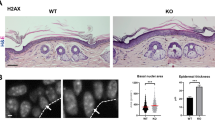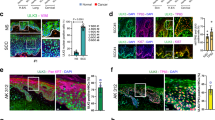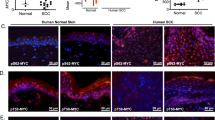Abstract
Minichromosomal maintenance protein 7 (MCM7) is an essential component of the replication helicase complex (MCM2-7) required for DNA replication. Although this function is highly conserved among eukaryotes, additional functions for the MCM molecules continue to be described. Minichromosomal maintenance protein 7 is a marker for proliferation and is upregulated in a variety of tumors including neuroblastoma, prostate, cervical and hypopharyngeal carcinomas. To further investigate the general role of MCM7 in tumorigenesis, we generated a mouse model with deregulated MCM7 expression _targeted to the basal layer of the epidermis using the keratin 14 (K14) promoter (K14.MCM7). When subjected to a two-stage chemical carcinogenesis protocol (dimethylbenz[α]anthracene (DMBA) initiation with 12-ortho-tetradecanoylphorbol-13-acetate promotion), K14.MCM7 mice showed significantly increased incidence and prevalence of tumor development relative to controls. Furthermore, within 40 weeks of treatment over 45% K14.MCM7 mice exhibited tumors that had converted to squamous cell carcinomas versus none in the control group. As predicted from previous skin carcinogenesis studies using DMBA as the initiating agent, Ras mutations where found in more than 90% of tumors isolated from K14.MCM7 mice. Whereas previous studies have shown that MCM7 is useful as a proliferation marker, our data suggest that deregulated MCM7 expression actively contributes to tumor formation, progression and malignant conversion.
This is a preview of subscription content, access via your institution
Access options
Subscribe to this journal
Receive 50 print issues and online access
We are sorry, but there is no personal subscription option available for your country.
Buy this article
- Purchase on SpringerLink
- Instant access to full article PDF
Prices may be subject to local taxes which are calculated during checkout




Similar content being viewed by others
Abbreviations
- K14:
-
keratin 14
- SCC:
-
squamous cell carcinoma
- DMBA:
-
dimethylbenz[α]anthracene
- TPA:
-
12-ortho-tetradecanoylphorbol-13-acetate
- HNSCC, head and neck squamous cell carcinoma∣MCM7:
-
mimichromosomal maintenance protein 7 (cdc47)
References
Arin MJ, Longley MA, Wang XJ, Roop DR . (2001). J Cell Biol 152: 645–649.
Ashman L, Murray AW, Cook MG, Kotlarski I . (1982). Carcinogenesis 3: 99–102.
Barrett JC, Anderson M . (1993). Mol Carcinog 7: 1–13.
Berton TR, Wang XJ, Zhou Z, Kellendonk C, Schutz G, Tsai S et al. (2000). Genesis 26: 160–161.
Brake T, Connor JP, Petereit DG, Lambert PF . (2003). Cancer Res 63: 8173–8180.
Bremner R, Kemp CJ, Balmain A . (1994). Mol Carcinog 11: 90–97.
Cao T, Longley MA, Wang XJ, Roop DR . (2001). J Cell Biol 152: 651–656.
Chan KK, Tsui SK, Ngai SM, Lee SM, Kotaka M, Waye MM et al. (2000). J Cell Biochem 76: 499–508.
Cromer A, Carles A, Millon R, Ganguli G, Chalmel F, Lemaire F et al. (2004). Oncogene 23: 2484–2498.
DiGiovanni J . (1992). Pharmacol Ther 54: 63–128.
DiGiovanni J, Naito M, Chenicek KJ . (1987). Genetic Factors Controlling Susceptibility to Skin Tumor Promotion in Mice. Raven Press: New York.
Eisenman RN . (2001). Genes Dev 15: 2023–2030.
Fernandez PC, Frank SR, Wang L, Schroeder M, Liu S, Greene J et al. (2003). Genes Dev 17: 1115–1129.
Forsburg SL . (2004). Microbiol Mol Biol Rev 68: 109–131.
Freeman A, Morris LS, Mills AD, Stoeber K, Laskey RA, Williams GH et al. (1999). Clin Cancer Res 5: 2121–2132.
Going JJ, Keith WN, Neilson L, Stoeber K, Stuart RC, Williams GH . (2002). Gut 50: 373–377.
Grutzmann R, Pilarsky C, Ammerpohl O, Luttges J, Bohme A, Sipos B et al. (2004). Neoplasia 6: 611–622.
Homesley L, Lei M, Kawasaki Y, Sawyer S, Christensen T, Tye BK . (2000). Genes Dev 14: 913–926.
Kukimoto I, Aihara S, Yoshiike K, Kanda T . (1998). Biochem Biophys Res Commun 249: 258–262.
Nallamshetty S, Crook M, Boehm M, Yoshimoto T, Olive M, Nabel EG . (2005). FEBS Lett 579: 6529–6536.
Nelson MA, Futscher BW, Kinsella T, Wymer J, Bowden GT . (1992). Proc Natl Acad Sci USA 89: 6398–6402.
Padmanabhan V, Callas P, Philips G, Trainer TD, Beatty BG . (2004). J Clin Pathol 57: 1057–1062.
Pasion SG, Forsburg SL . (2001). Genet Eng (New York) 23: 129–155.
Ren B, Yu G, Tseng GC, Cieply K, Gavel T, Nelson J et al. (2005). Oncogene, E-pub October 17.
Shohet JM, Hicks MJ, Plon SE, Burlingame SM, Stuart S, Chen SY et al. (2002). Cancer Res 62: 1123–1128.
Sterner JM, Dew-Knight S, Musahl C, Kornbluth S, Horowitz JM . (1998). Mol Cell Biol 18: 2748–2757.
Tye BK, Chang VK . (2004). Front Biosci 9: 2548–2555.
Tye BK . (1999). Annu Rev Biochem 68: 649–686.
Waikel RL, Kawachi Y, Waikel PA, Wang XJ, Roop DR . (2001). Nat Genet 28: 165–168.
Waikel RL, Wang XJ, Roop DR . (1999). Oncogene 18: 4870–4878.
Wang Y, Xu F, Hall FL . (2000). FEBS Lett 484: 17–21.
Wharton SB, Chan KK, Anderson JR, Stoeber K, Williams GH, Wharton SB et al. (2001). Neuropathol Appl Neurobiol 27: 305–313.
Wharton SB, Hibberd S, Eward KL, Crimmins D, Jellinek DA, Levy D et al. (2004). Br J Cancer 91: 262–269.
Woodworth CD, Michael E, Smith L, Vijayachandra K, Glick A, Hennings H et al. (2004). Carcinogenesis 25: 1771–1778.
Yoshida K, Inoue I . (2003). FEBS Lett 553: 213–217.
Yuspa SH, Poirier MC . (1988). Adv Cancer Res 50: 25–70.
Acknowledgements
We thank Dr Tohru Kiyono for the human MCM7 cDNA and Dr Timothy McDonnell for help with the histopathology of the chemically derived tumors. JMS gratefully acknowledges the generous support from the Hope Street Kids foundation and the Logenbaugh foundation and is supported by NIH Grant KO-8 CA90517-02 (JMS).
Author information
Authors and Affiliations
Corresponding author
Rights and permissions
About this article
Cite this article
Honeycutt, K., Chen, Z., Koster, M. et al. Deregulated minichromosomal maintenance protein MCM7 contributes to oncogene driven tumorigenesis. Oncogene 25, 4027–4032 (2006). https://doi.org/10.1038/sj.onc.1209435
Received:
Revised:
Accepted:
Published:
Issue Date:
DOI: https://doi.org/10.1038/sj.onc.1209435
Keywords
This article is cited by
-
Bioinformatics approaches identified dasatinib and bortezomib inhibit the activity of MCM7 protein as a potential treatment against human cancer
Scientific Reports (2022)
-
Pathophysiological Effects of Lycosa erythrognatha Derived Peptide LyeTxI-b on RKO-AS-45-1 Colorectal Carcinoma Cell Line Using the Chicken Chorioallantoic Membrane Model
International Journal of Peptide Research and Therapeutics (2022)
-
Transcriptional expression and prognostic roles of MCM7 in human bladder, breast, and lung cancers: a multi-omics analysis
Network Modeling Analysis in Health Informatics and Bioinformatics (2022)
-
MCM8 is regulated by EGFR signaling and promotes the growth of glioma stem cells through its interaction with DNA-replication-initiating factors
Oncogene (2021)
-
Reduced replication origin licensing selectively kills KRAS-mutant colorectal cancer cells via mitotic catastrophe
Cell Death & Disease (2020)



